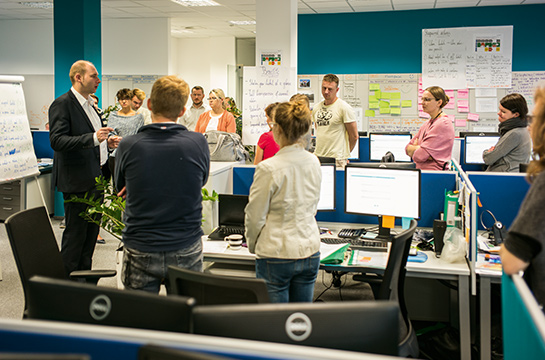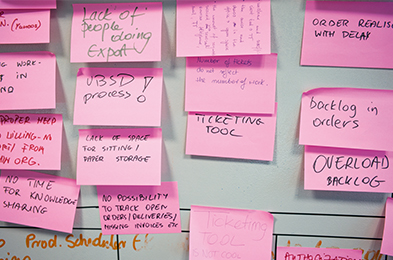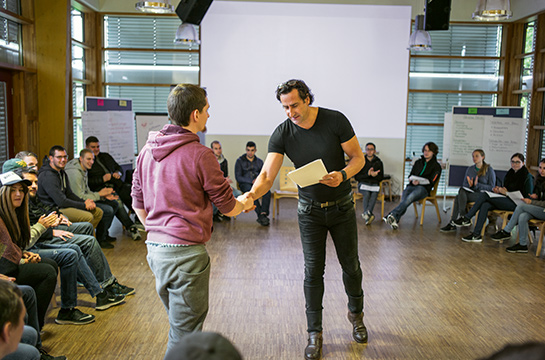The Lodz Roadmap
For its ambitious managing director, the Shared Services Center in Lodz, Poland is an opportunity to put leadership qualities to the test. The bundling of complex services is a priority for Clariant. Those who organize these services in a more streamlined, affordable way have a decisive advantage in global competition.
PHOTOGRAPHY Jo Röttger
TEXT Bertram Job
Tomasz Lesniewski could curse this elevator. It is probably the slowest elevator in central Lodz, if not the entire Republic of Poland. It feels like it takes an eternity to move between two floors. Far too long for someone who has such ambitious goals and is always pushing forward. Yet Tomasz still relies on the old elevator for talking with his employees, as they bustle about on several floors of the »Orange Plaza« – one of two buildings 500 meters apart that currently serve as a fixed address for his company.
However, these circumstances don’t really annoy this tall, lanky man. They indirectly represent a problem that is good to have. When Lesniewski took over management here in mid-2015, the Clariant’s Shared Services Center (SSC) in Poland had 70 employees. By the winter of 2016, the number of employees had grown to 220 and could soon increase to 300. There is a sense of pride in growing that quickly. More and more people also means the need for more and more chairs, desks, and space. This works until another floor is bursting at the seams.
But there is no going back now, only moving forward. That’s the only direction Lesniewski is interested in. »Soon we will have our own building,« he tells his visitors as he rushes through the halls to quickly clarify something again. »We hope to move in as early as the beginning of next year.«
Educated as an engineer and certified accountant, he is determined to use his reputation and all of his energy to expand the Shared Services Center in his hometown. This is not simply about becoming larger. It is about a complete »Journey of Transformation,« he emphasizes. It should redefine the value of the location. It is no longer merely the starting point of payment transactions in Europe, but a globally operating nerve center for far more complex services. End-to-end processes, as they are referred to in process-management jargon.



»We want to become an ever more efficient organization,« explains Lesniewski. »That means that we must change the way we work as well as shape the processes we are responsible for.«
This means clearly defined, standardized customer services like order-to-cash, data-to-insight, source-to-pay, etc. And those who believe these processes are a secondary matter are very much mistaken. In the operational business of international companies, these types of computer or IT-enabled services support important transactions from accounting to procurement to logistics. If successful, this means leaner structures and greater efficiency.
It was no coincidence that Clariant started to bundle these types of processes into a separate organization within the company in 2013. Within Global Business Services (GBS), methods with which the end-to-end services can be controlled as uniformly and cost-effectively as possible should be optimized and implemented. This is currently being done in three global services centers. They operate out of India, the Chinese city of Dalian, and – as mentioned – out of Lodz, Poland’s third largest city, which is home to 700 000 people and located about one and a half hours west of Warsaw by car.
The decision is a vote for the location which has already proven itself in other contexts. Two years ago, one of the most modern production facilities for Clariant’s Business Unit Masterbatches was opened outside the center in Konstantinov Lodzki. Since then, it has served as a model. And for Tomasz Lesniewski, it is »a great opportunity to manage my own organization.« He is willing to withstand the pressure that something like this entails. »It’s up to me to handle it, and it is up to me to deliver in line with expectations. I am responsible for this.«
Tomasz LesniewskiHead of the Shared Services Center, Poland»We want to become an ever more efficient organization. That’s why we must change the way we work as well as shape the processes we are responsible for.«
He has had enough training to think outside the box. Soon after his graduation in Lodz, Lesniewski worked for a hardware multinational in Ireland. Back in Poland, he was then employed in one of the first service centers, as well as for a market leader for outsourced services. He completed his master’s degree in business administration in the U.S. at the University of Illinois. And now, this challenge that goes far beyond the performance spectrum of conventional service centers: to be different, faster, more comprehensive, simply better, and more sustainable than others.
»In two years, we have become one of the largest centers in the city,« adds Lesniewski when he is back in his own office – at a desk that is not unorganized despite the heavy workload. »Others need ten years to do that. And when it comes to the complexity of operations, we are already a leader.«
This has to do with his ambition and his fondness for methodology at all levels. Hardly any space on the walls remains unoccupied. Memos containing diagrams, data, and arrows, which should ensure any process, are stuck all over them. Informal meetings and talks are on the daily agenda. And there is also a workforce that puts the drive of the mastermind into constant performance. The average age of its employees is 30 years old, and with 30% of its workers coming from other countries, it is most likely more international than any other in this city.
Employees from Western Europe, Latin America and elsewhere can talk to their customers in the respective regions in their language. Forty people alone with Latin American roots cover the LATAM region and provide a lively atmosphere in the offices. According to Lesniewski, there is a reason why there is much more interaction here than in most of the more than 70 services centers in Lodz: »The people get to know each other here. I’ve also had other experiences in my own career ...«


A good atmosphere, multiculturalism, and social events – from bowling nights to going mountain biking together – make up for some of the downsides of the location. Lodz is still not one of the most attractive corners of the Republic. The former textile stronghold, also called »the Manchester of Poland,« strives for further restructuring. Many small shops, restaurants, and cafes have moved into deserted factories and old courtyards – nice gathering places for young employees who prefer the rough charm over the slick chic.
Tiago Ferreira says he loves this city anyway. The 32-year-old from the small town of Suzano near São Paulo would love most of all to persuade his parents and all four sisters to come here. For him, the work with the procurement team was »an opportunity to finally have a life.« Douglas Campos, who shares an apartment with him and a colleague from Venezuela, views it similarly. Here, the shift often goes from noon until the late evening, says the 21-year-old, »but I can make my own decisions on the job and work in larger contexts.«
These opportunities will continue to show up more frequently. Since 2015, the Latin America and Middle East & Africa regions have been tested to see whether Lodz is already positioned to offer customer services beyond Europe. In 2016, they began to manage selected processes for the Functional Minerals Business Unit from here. This did not run smoothly in every case, but optimizations have already been made. With this, two Clariant programs, »Lean« and »Excellence« play a decisive role, as well as an »ideal state« agreed on with GBS – an optimal state that is expected to be achieved at the end of a »Lean Transition Journey« in 2018.
Ultimately, Tomasz Lesniewski would like to move forward quickly and methodically. Thus, failure is not an option. »We know what we are doing today and what we need to do tomorrow. And we have a very structured program here that will soon grow.«


